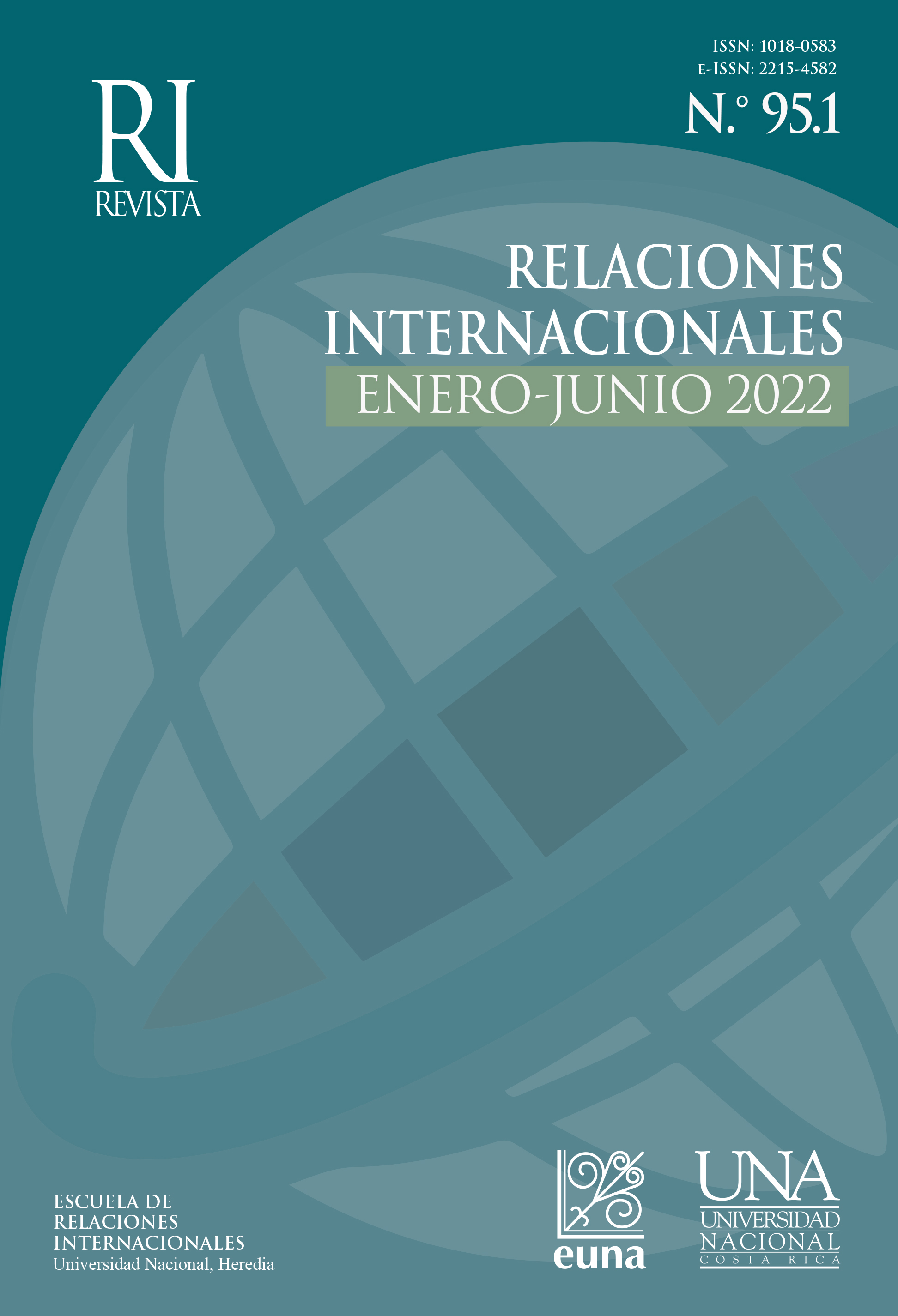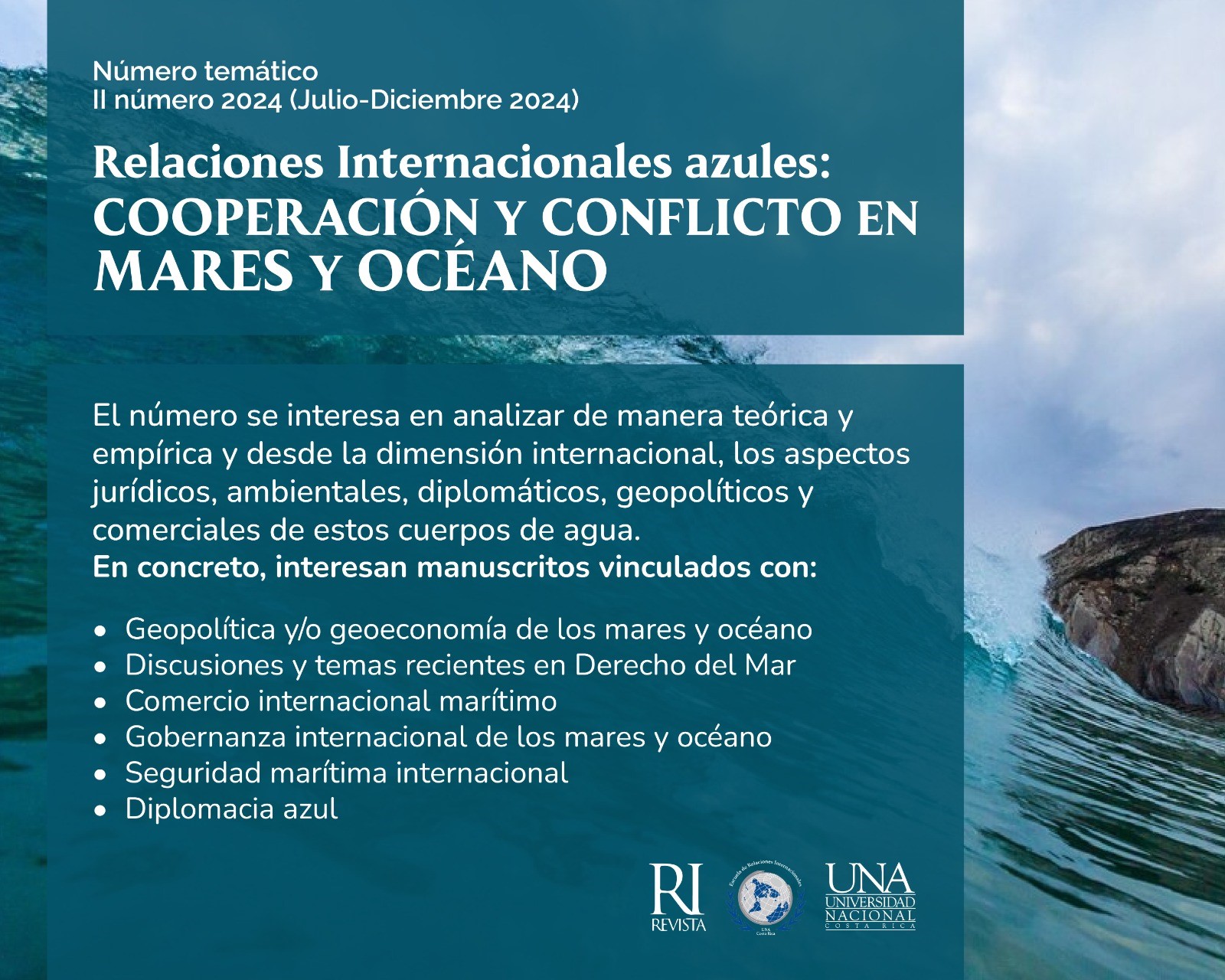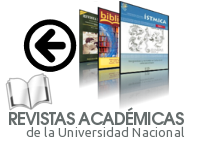2022: Lo impredecible como constante
Palabras clave:
COVID, impredecibilidad, incertidumbre, pandemia, geopolítica, futuroResumen
El pasado 18 de diciembre del 2021 la revista estadounidense The Economist publicó un artículo corto titulado The new normal is already here. Get used to it. (“La nueva normalidad ya está aquí. Acostúmbrate.”) con una muy interesante línea de inicio, que usa cierto juego de palabras: “The era of predictable unpredictability is not going away” (“La era de la impredecibilidad predecible no se irá”). Si bien es cierto, la afirmación parece una paradoja y no es novedosa per se, su pertinencia y necesidad de reconocimiento es de suma urgencia en un mundo que, dos años después de haber iniciado la pandemia por COVID-19, continúa experimentando transformaciones aceleradas.
Referencias
Adam, B. L. (2021). Theorizing unpredictability in international politics: a new approach to Trump and the Trump Doctrine, Cambridge Review of International Affairs, 34:3, 360-382, DOI: 10.1080/09557571.2020.1842329
Armstrong, K. (2021). Rationality: What It Is, Why It Seems Scarce, Why It Matters by Steven Pinker review | Science and nature books | The Guardian. Recuperado 29 de diciembre de 2021, de https://www.theguardian.com/books/2021/oct/07/rationality-what-it-is-why-it-seems-scarce-why-it-matters-by-stevenpinker-review
Avishai, B. (2020). The Pandemic Isn’t a Black Swan but a Portent of a More Fragile Global System The Economist. Recuperado 30 de diciembre de 2021, de https://www.newyorker.com/news/daily-comment/the-pandemic-isnt-ablack-swan-but-a-portent-of-a-more-fragile-global-system
Bernstein, S; Lebow, R.; Stein, J.; et al. (2000). God gave physics the easy problems: adapting social science to an unpredictable world. European Journal of International Relations 6(1):43-76.
Bueno de Mesquita, B., Newman, D. & Rabushka, A. (1985). Forecasting Political Events: The Future of Hong Kong. New Haven, C. T.: Yale University Press.
Burrows, M. & Manning, R. (2021, diciembre 21). The top twelve risks and opportunities for 2022. Atlantic Council. https://www.atlanticcouncil.org/content-series/atlantic-council-strategy-paper-series/the-top-twelve-risks-and-opportunities-for-2022/
Choucri, N. (1974). Forecasting in international relations: problems and prospects. International Relations 1(2): 63-86.
Engelke, P. (2021, diciembre 21). Six ‘snow leopards’ to watch for in 2022. Atlantic Council. Recuperado 29 de diciembre de 2021, de https://www.atlanticcouncil.org/content-series/atlantic-council-strategy-paper-series/
six-snow-leopards-to-watch-for-in-2022/
Feldscher, K. (2021). What will it be like when COVID-19 becomes endemic?https://www.hsph.harvard.edu/news/features/what-will-it-be-like-when-covid-19-becomes-endemic/
Fomin, I., Kokarev, K., Ananyev, B., Neklyudov, N., Bondik, A., Glushkov, P., Safina, A., Stolyarova, S., Tkach, D., Vedernikova, O., Yakovenko, I., Korobkova, D., Kovaleva, D., Kuzina, E., Voronina, D., Chekov, A., Sushentsov, A., & Wohlforth, W. (2021). International studies in an unpredictable world: still avoiding the difficult problems? European Journal of International Relations, 27(1), 3-28. https://doi.org/10.1177/1354066120948124
McGillivray, G. (2020).Coronavirus is significant, but is it a true black swan event?The Conversation. Recuperado 30 de diciembre de 2021, de http://theconversation. com/coronavirus-is-significant-but-is-it-a-true-black-swan-event-136675
Metternich, N. & Gleditsch K. (2016). Forecasting in international relations. In:[Oxford Bibliographies in] International Relations. Oxford University Press.
Newson, L. & Richerson, P. (2021, April 25). What if COVID-19 had emerged in 1719? OUPblog. https://blog.oup.com/2021/04/
what-if-covid-19-had-emerged-in-1719/
Rutjens, B. T., van der Linden, S., & van der Lee, R. (2021). Science skepticism in
times of COVID 19. Group Processes & Intergroup Relations, 24(2), 276-
https://doi.org/10.1177/1368430220981415
Scartozzi, Cesare M. “A New Taxonomy for International Relations: Rethinking the International System as a Complex Adaptive System.” Journal on Policy and Complex Systems 4, n.° 1 (2018): 109-33. https://mpra.ub.uni-muenchen.de/95496/2/MPRA_paper_95496.pdf
Schneider, G.; Gleditsch, N. & Carey, S. (2011). Forecasting in international relations. Conflict Management and Peace Science 28(1): 5-14.
The Economist. (2021). The new normal is already here. Get used to it | The Economist. Recuperado 30 de diciembre de 2021, de https://www.economist.com/leaders/2021/12/18/the-new-normal-is-already-here-get-used-to-it
Welch, D., Geoghegan, J., Ligt, J. de, & French, N. (2021). Why more contagious variants are emerging now, more than a year into the COVID-19 pandemic.
The Conversation. Recuperado 29 de diciembre de 2021, de http://theconversation.com/why-more-contagious-variants-are-emerging-now-more-than-ayear-into-the-covid-19-pandemic-155302
Descargas
Publicado
Cómo citar
Número
Sección
Licencia
Esta publicación está adscrita a Creative Commons; deben respetarse sus atribuciones y restricciones.
Los autores/as que publiquen en esta revista aceptan las siguientes condiciones:
- Los autores/as conservan los derechos de autor y ceden a la revista el derecho de la primera publicación, con el trabajo registrado con la Licencia Creative Commons Atribución-NoComercial-CompartirIgual 4.0 Internacional, que permite a terceros utilizar lo publicado siempre que mencionen la autoría del trabajo y a la primera publicación en esta revista.
- Los autores/as pueden realizar otros acuerdos contractuales independientes y adicionales para la distribución no exclusiva de la versión del artículo publicado en esta revista (p. ej., incluirlo en un repositorio institucional o publicarlo en un libro) siempre que indiquen claramente que el trabajo se publicó por primera vez en esta revista.
- Se permite y recomienda a los autores/as a publicar su trabajo en Internet (por ejemplo en páginas institucionales o personales) antes y durante el proceso de revisión y publicación, ya que puede conducir a intercambios productivos y a una mayor y más rápida difusión del trabajo publicado.
Revista de Relaciones Internacionales por Universidad Nacional de Costa Rica está bajo una Licencia Creative Commons Atribución-NoComercial-SinDerivar 4.0 Internacional









.png)



2.png)
